Drogheda Independent 1884-current, 09.03.1907, page 6
United Irish League
MEETING AT SWORDS
On Sunday afternoon a public meeting was held at Swords in support of the Irish P..arty and the United Irish League. A platform a had been erected in the main street, and a crowd number-ing close upon a thousand persons assembled around it.
It was noticeable that the audience consisted very largely of listened to the speeches with the greatest interest. Previous to the meeting the two excellent bands of the town played through the streets and per-formed selections, of National music near the platform. Thr.se were the St Columbkille’s Brass and Freed Band and the St Columbkille’s Fife and T …Awn Band.
On the motion of Mr Thomas Reilly, seconded by Mr M`Lean, the chair was taken by Mr Thomas M`Mahon.
Among those present were :–
St Margaret’s Branch UIL; M Dunne, D C; C Gilsennan, P Crowley, M M‘Donnell, W Reilly, J Lumley, J Coleman, D Connor, H Connor, D Farrell.
Swords: Messrs F Lawless, B Devine, J Farrell, 0 Kavanagh, J Savage, P Cleary, P Moran, G M`Mahon, T Barnane, E Hughes, P Stafford B Fagan, J Fitzpatrick, R Morgan, C Connor, J Carey, .1 Dempsey, A Fitzpatrick, M M’Co.rmack, Moran, A, Kettle, T Reilly, T M` Clean, J Kettle, P Early, P Canon, M Kane, J Marks, J O’Toole, J Carey, T O’Keefe, 0 Lawlor, P M`Glew, P Carroll, Li Rourke, M‘Gartlan, Connolly, J Duff, P J Kettle, Co C ; P Wilson, P J Quaid, W Lenahan, W Howard, T M(Grane, J O’Toole, P Long, P Lyons, M Kane, E Clarke, M Walsh, P Corrigan, J Brangan.
Balheary: J Bollard, J Bell, P Wilson, J Barrett, IV Byrne, — M’Cloud, J Boylan, T Kelly, T Courtney, J Courtney, M Ennis, R Clarke, M Ennis, J Stafford.
A letter was read from Mr J J Clancy, M P, expressing his regret at his unavoidable absence.
The Chairman said the Nationalists of Ireland had cause to rejoice. Times had changed since the voters could be driven to the poll by the land-lords. Now they could return the mea of their choice (applause). After Gavan Duffy left Ire-land a corpse on the dissecting table, a new National spirit came. James Stephens (applause) visited that town, and since that time the National struggle had been steadily carried on. The League and the Irish Party had taken up the fight and had won great concessions for the people. The tenant-farmer no longer feared the landlord (applause). The labourers were getting cottages, and he h9ped that soon the grazing ranches would be cut up and divided among the labourers (loud applause). Although the fight was now carried on in a constitutional way, the men of Ireland should be still actuated by the old spirit of resistance to landlord tyranny and foreign misgovernment (applause).
Mr P J Kettle, Co C, moved the adoption of the following resolutions :—
“That this meeting of the Nationalists of Swords heartily endorse the policy and action of the Irish Party in Parliament under Mr John E Redmond’s leadership, and condemn any attempt to interfere with the Party’s usefulness by meaningless attempts at faction.”
“That we demand the establishment in Ire-land of an Irish Parliament elected on a popular franchise and with full power to administer the internal affairs of the nation.”
“That we demand the very fullest benefits for the labourers under the present Labourers Act, and publicly thank the Irish Party for securing the passage of that Act through Parliament.”
“That we urge the hearty support of Irish manufactured goods and the language revival movement.”
” That the present system of University and Primary Education in Ireland is a source of continual danger to National advancement and a scandal of the greatest magnitude demand-ing immediate attention and sweeping re-form.”
Mr Kettle said there was one question in the mind of all present, and they represented not only the people of that large town of Swords, but of the surrounding district. That question was the reform of the gOvernment of the country. No doubt, some progress had been made. But were they satisfied ? Were they content to sit down and do no more ? (” No, no.”) No ; they would never be satisfied until their National demand had been fully met, and they would continue to agitate and organise until they had been met to the fullest extent (applause). Take the Land Question. The landlords had been done justice, and more than justice. They had been given a bonus and the power of extorting more than the value of their interest in the land in purchase prices ?
The tenants should have got .a bonus as well as the landlords (laughter and applause.) A Bill was be soon introduced, a sort of Home Rule Bill. If it was not a good Bill, they. must be ready, they must be organised, and then they could immediately express the National voice through that organisation. It ought to be a Bill that would be on a basis that would finally enable us to make Ireland an industrious and prosperous nation, a home. where Irishmen could live and thrive in the future (applause), Some Irishmen were apt to be carried away by the promises of British statesmen. They made fine promises and then they became ambassadors or some-thing of the kind (hear, hear). Never had such promises been made by any of them as by the present Chief Secretary. By the first of May next the evicted tenants were to be restored (hear, bear), and there were promises of a Home Rule Bill, and a University Bill. But let them not be deluded. Let the people be organised so that, if necessary, they could compel them to carry out the promises they had made. Again, on the Labourers’ Question, unless we had the population we never could have a prosperous country. We must seek to stop emigration, and the way to do that was to provide a means of livelihood for the people at home (applause).
The labourers had fought like soldiers for the farmers and for the nation. Without them these reforms we had would never have come about. Now that it was their turn, the farmers should not only support the labourers’ claims, but should, in common gratitude, make it their duty to see that they got justice without delay under the new Act (applause). Our country was full of reminders of lost industries—monuments of decay. The loss of these industries was partly owing to our own want of thought. We had never asked ourselves the question in the past why should we not encourage the industries of our own country. But that question should be kept to the front in the future when we were spending our own money, over which we had full control. All these things showed the necessity for going beyond mere support of the National movement. . They were reasons why we should join and become active members of the National organisation, so that our wishes might be voiced by the right men in the right way, and the members we sent to Parliament and to other public bodies should be backed up by the combination and organisation of the people in their lab9urs to benefit the people (loud applause).
Mr Denis Johnston, who had a hearty reception, said be had already addressed a meeting that day at St Margaret’s, and there, as here, he was very anxious to support the demand of the the • la tourers of • the district • for the full justice to which they were en=• titled. under the Act . of 4906 ..(applause). They were entitled under that Act to a cottage and an acre of land. That was not an illegal demand. it was simply that the law of the land- should be put into force, and that the monies which are now at the disposal of the district councils should be utilised Witlf.. the least possible delay for the purpose of providing substantial cottages and allotments. He said the labourers deserved well of the ‘country (applause). It was the duty of . the farmers now to see that justice was done t9 the labourers.
Not only so, but it was the interest of the farmers to keep the labourers at home, and the best way to do that was to give them cottages and land. If the labourer had a comfortable home and was interested in his own plot, and he had family associations and ties of that kind, he would be slow to break up all these by emigrating. (A Voice—That’s the truth). And for another reason the farmer would be well advised to keep the labourer at home. The days of making money by cattle raising and butter-making in Ireland were passing away.
The farmers would have to go back upon tillage (hear, hear). They were being driven slowly, but surely, in that direction, because they were being forced out of the English market for beef and butter by foreign competition. If they had to go back to tillage, what would be the position of the farmers if they had no labourers to assist them ? He did not want to see the pigtails brought over to Ireland to assist in developing Irish land (laughter and applause). The labourer was entitled to a place in the land that gave him birth. The labourers were often evicted tenants, or the sons of evicted tenants, people who had been landholders, and had been driven off the land by bad laws and bad administration. Justice and common sense demanded that they should be restored to the land they had been driven from (loud applause). He proceeded to thank them for the resolution of confidence in Mr John Redmond and the Irish Party.
The labourers had a good right to thank them, because throughout the last session they were engaged in securing and passing this great measure for the labourers. He hoped that their expression of confidence would be followed by the formation of a strong branch of the League in that district—such a branch as would be a proof to Mr Redmond and the Party that they were thoroughly and entirely at their back in this movement (applause). It was the right of every nation to make laws and administer its finances in accordance with the interests of its people. But we were denied that right, and we would be justified in Routing, and fighting in every way, an administration that was organised without the support of the people. We paid twelve millions a year in taxation, paid it directly and indirectly on tea, tobacco, and other articles. How was all this money spent ? (A Voice—On drink).
A very large proportion of it was badly spent, wastefully spent, instead of being available for the promotion of Irish industries, for the drain-ing of the land, for the provision of better housing accommodation for the workers, or for the development of the resources of the country. That system ought to be swept away, and we had a Government in power that was inclined to sweet away at least some of the scandals attached t9 the system. One reason why that meeting was being held was, that when the Government Bill was produced a National Convention would be held to decide whether the measure was to be accepted or rejected, and that Convention should include the representative men of County Dublin, who would voice the opinions of the organised Nationalists throughout the county.
Farmers, labourers, shopkeepers—everyone—was interested in this decision, and the great County of Dublin should be properly represented at this great National Convention (applause). As to the University question, Sir Horace Plunkett had imported Scotsmen to teach the women of Ireland how to get the hens to lay eggs (laughter), and, when attacked for that, said he required men of University attainments for such work, and he could not get men with University training in Ireland. That w as only an excuse because Sir Horace Plunkett was a Unionist and a supporter of the late Government, which was twenty years practically in power, and never took a single step to give the Irish people the opportunity of University education. He (the speaker) held, and he believed they would all agree with him, that the highest education should be in the reach of every man who had brains and genius, whether he was the son of the rich or of the poor, the labourer, the farmer, or the lord, if he was able to pass the examination necessary to his progress.
The genius of a country, no matter in what station it was found, should be utilised for the purpose of developing that country ; but unfortunately in this country the best education had been confined. to one class, and one sect, and the mass of the people had been denied education. He believed the Irish Party had every man and woman in that splendid meeting at their back in sup-porting this reform (applause). But he would appeal to them from a higher standpoint. So far he had spoken of material things. Above all, there was the duty 9f all to assist in building up the Irish nation. We were only three millions now, when we were nine millions sixty years ago. There was no room for differences amongst that remnant of a great race if the work before them was to be accomplished. Let them all work together.
Let the Gaelic League, of which they were all proud ithad cultivated the National spirit in many ways—and the United Irish League work together; let everybody sink selfish interests in the work of building up a thoroughly organised and united Ireland. Everything depended upoli that. Our industries, our language, our whole National welfare depended upon sinking all little jealousies, and remembering that we were all children ‘oft a coon non mother, that mother Ire-land, who now called for our help and loyalty (loud applause). Mr Michael Dunne, D C, urged all to join the League. It was not for creed or class, not for labourers or farmers, but f9r all ; and if the labourers got the majority of a branch they could select their own members for the local boards and Parliament, and carry them by organised force. They had a branch at St Margaret’s, and they applied for eleven labourers’ cottages at the last Inquiry, and they got ‘what they asked for. (A Voice —They are not the same farmers here laughter). The speaker paid a fine tribute to Michael Davitt, as if the founder of the Organisation, quoting the words of Mr Stephen Gwynn, MP:
The convict cripple matched his will against an Empire’s might, Banded the weak against the strong, and fought and won the fight.” (Loud applause. The resolutions were carried unanimously, and on the motion of Mr Johnston, seconded by Mr Peter Wilson, a vote of thanks was passed to the Chairman. The proceedings concluded with cheers for Mr Redmond and the .Irish Party and the *United League. Subsequently a large number of those present took out their cards of. membership of the League.



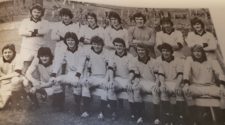
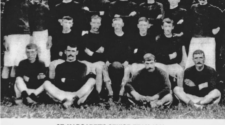
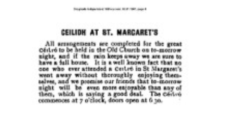
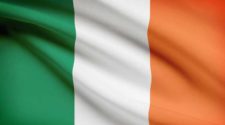

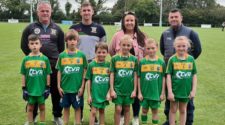
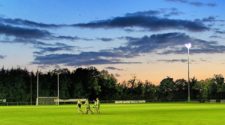
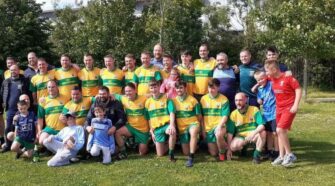
No Comment